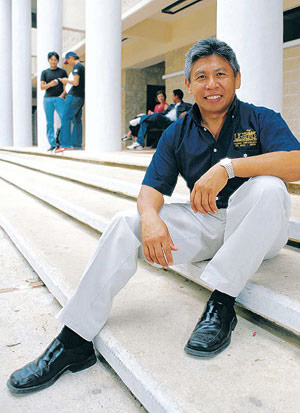 |
 [an error occurred while processing this directive]
[an error occurred while processing this directive]
[an error occurred while processing this directive]
[an error occurred while processing this directive]
|
 |
|
 |

Spring 2005: 40 Years
jose a. granados
Francisco Rosado-May
President, University of Quintana Roo at Chetumal, Mexico
Ph.D. Biology, 1991
Francisco Rosado-May’s path to the presidency of a public university in Mexico began in the rural village of Felipe Carrillo Puerto, where he and other eager Mayan youngsters gathered in a hallway to take classes. “I vividly remember the end of my first year, when my teacher called me to her house and gave me a big can of cocoa—my first cocoa ever—for having very good grades,” recalls Rosado-May.
Teachers continued to encourage Rosado-May, who earned government fellowships to attend high school and to study agricultural engineering in Tabasco, Mexico. That’s where he first met his mentor, Stephen Gliessman, a pioneer in the field of agroecology.
For Rosado-May, the affiliation with Gliessman was life changing. After earning a master’s in tropical ecology, Rosado-May followed his mentor to UCSC in 1985 for doctoral study. At UCSC, he also worked closely with biology professor Jean Langenheim (see page 23), a leader in the field of chemical ecology. Building on Gliessman and Langenheim’s work, Rosado-May focused on the role of weeds in the management of agroecosystems. “In Tabasco, farmers believe that once you learn how to manage weeds properly, they become your allies, not your enemies,” said Rosado-May.
While at UCSC, Rosado-May embraced his ancestry. As a Maya in Mexico, he has frequently felt the sting of discrimination. “I grew up in the days when the federal government was trying to homogenize the country,” recalls Rosado-May. “Getting to know other UCSC students who were proud of their origins, especially Native Americans, was eye-opening for me. Now I take pride in my ancestry, but before going to California, I could hardly talk about it.”
While completing his doctorate, Rosado-May joined the team that was planning the campus for his native state of Quintana Roo—the only Mexican state without a university. “The challenge was to create a model that would respond to the needs of a rapidly changing world,” says Rosado-May.
Founded in 1991, the University of Quintana Roo (UQRoo) in Chetumal emphasizes teaching excellence and research that addresses real-world problems. As a founding faculty member, Rosado-May shifted his own focus from chemical ecology to applied ecology. Tourism has placed tremendous pressures on the natural resources of Quintana Roo, and Rosado-May’s work fueled environmental planning changes, including zoning reforms and the adoption of management plans for protected areas.
As president, Rosado-May has aggressively sought accreditation for the young campus’s programs, and his administration has adopted “transparent” accountability practices and expanded funding sources to reduce reliance on government subsidies.
Rosado-May’s pride in his Mayan heritage is accompanied by high expectations—for himself and his community. Halfway through his first four-year term as president of UQRoo, he is promoting programs that integrate ancient Mayan knowledge into the fields of science, technology, and the arts. “Can you imagine a botanist with a Ph.D. and a shaman who cures disease with local plants standing side by side?” he asks. “The synergy between conventional education and traditional knowledge might represent the best potential Mexico has to face the challenges of globalization.”
—Jennifer McNulty
---
PDF Version
|





